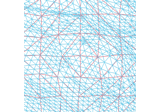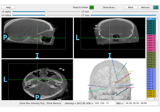mne.coreg.get_mni_fiducials#
- mne.coreg.get_mni_fiducials(subject, subjects_dir=None, verbose=None)[source]#
Estimate fiducials for a subject.
- Parameters:
- subject
str The FreeSurfer subject name.
- subjects_dirpath-like |
None The path to the directory containing the FreeSurfer subjects reconstructions. If
None, defaults to theSUBJECTS_DIRenvironment variable.- verbose
bool|str|int|None Control verbosity of the logging output. If
None, use the default verbosity level. See the logging documentation andmne.verbose()for details. Should only be passed as a keyword argument.
- subject
- Returns:
- fids_mri
list List of estimated fiducials (each point in a dict), in the order LPA, nasion, RPA.
- fids_mri
Notes
This takes the
fsaverage-fiducials.fiffile included with MNE—which contain the LPA, nasion, and RPA for thefsaveragesubject—and transforms them to the given FreeSurfer subject’s MRI space. The MRI offsaverageis already in MNI Talairach space, so applying the inverse of the given subject’s MNI Talairach affine transformation ($SUBJECTS_DIR/$SUBJECT/mri/transforms/talairach.xfm) is used to estimate the subject’s fiducial locations.For more details about the coordinate systems and transformations involved, see https://surfer.nmr.mgh.harvard.edu/fswiki/CoordinateSystems and Source alignment and coordinate frames.

